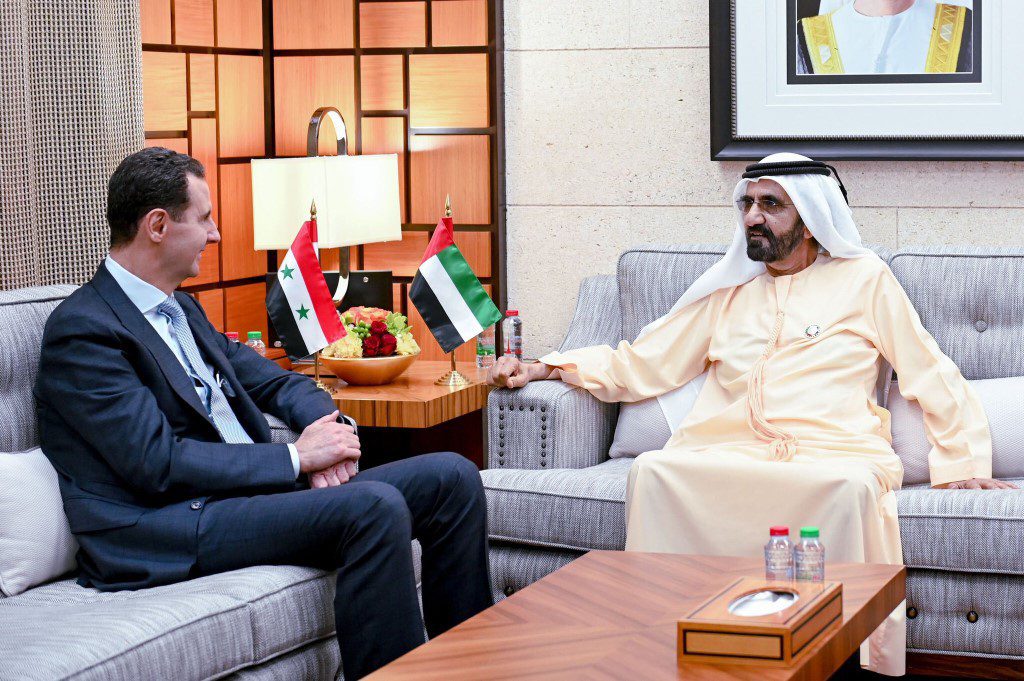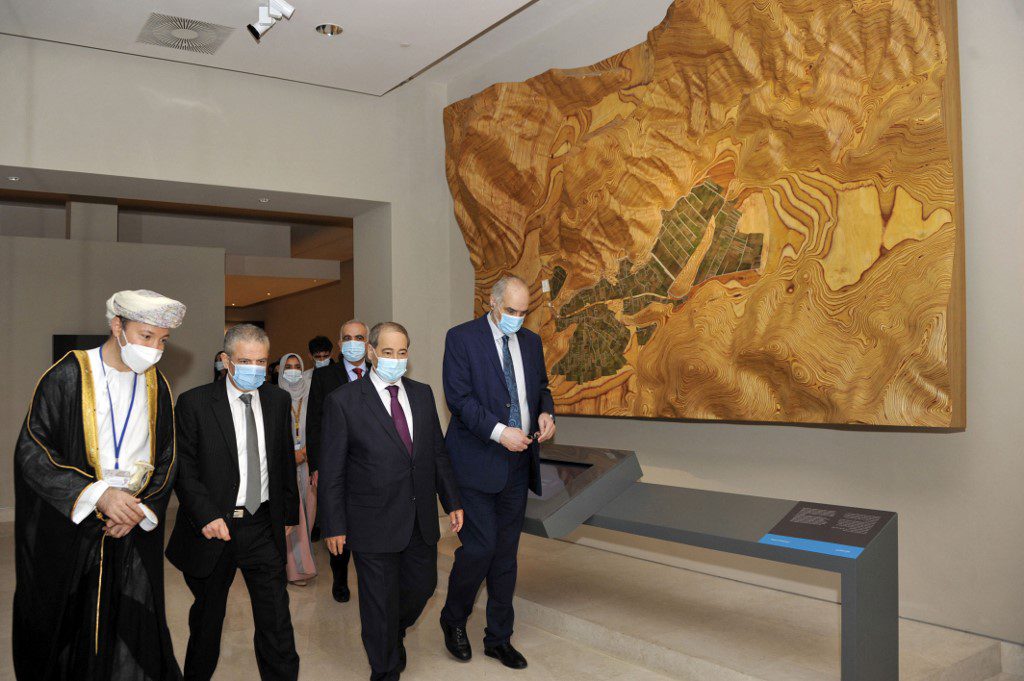
Author:
Nabil Mohamad, Syrian journalist and writer
Supervised and edited by:
Mohammed Kafina & Erik Prins, senior editors of Fanack
Introduction
The Syrian regime lived through relations of all kinds with the Arab regimes, raging between strong alliances and fierce hostility. It maintained relations with regimes governed by totalitarian nationalist parties similar to the ruling Ba’ath Party in Syria, like Yemen. It had enemies from the same pole, like Iraq during President Saddam Hussein.
Furthermore, it had allies and enemies among the Gulf monarchies, with which it had fluctuating relations throughout time Qatar was once its ally and, following the outbreak of the Syrian crisis, once again its enemy.
The same applies to Saudi Arabia. However, when the Syrian protesters flooded the streets, calling to overthrow the Syrian regime, the Syrian stance towards any Arab country became dependent on that country’s stance towards what was happening in Syria. Those who regard it as a popular revolution, are enemies, and those who see it as a conspiracy, are friends.
Arab Isolation
Before the outbreak of the Syrian revolution in March 2011, Arab-Syrian relations were relatively good, especially with the Gulf states. But these relations cooled off following the assassination of former Lebanese prime minister, Rafic Hariri, which the Syrian regime and its allies in Lebanon were blamed for. Later on, relations were restored, as Syrian President Bashar al-Assad exchanged visits with political leaders in Saudi Arabia and Qatar in 2009 and 2010. The peak of these friendly relations was reached with Qatar, which described the nature of their relations as a “strategic alliance”. Relations with the UAE and Kuwait have always been unique, especially on the economic level. In contrast, their investments in Syria were at an all-time high before events turned dark.
When the Syrian revolution started, many Arab countries, including the Gulf Cooperation Council (GCC) member states, called on the Syrian regime to introduce reforms and stop the military escalation against the popular protests. The Arab stance became clear after several meetings at the level of Arab foreign ministers and official consultations between countries. Following the meeting of Arab foreign ministers in Cairo on November 11, 2011, Syria’s membership in the Arab League was suspended, and Arab countries decided to withdraw their ambassadors from Damascus.
The joint Arab action on the Syrian question continued with meetings which produced an Arab plan of action. This plan was announced after the meeting of Arab foreign ministers in Cairo on January 22, 2012. Its most notable clause was forming a national unity government within two months, with the participation of the regime and the opposition, in addition to granting al-Assad’s deputy full authority to cooperate with the national unity government for a political transition in Syria.
We can divide Arab positions toward the Syrian regime during the early years of the crisis into two:
1- Countries calling for arming the Syrian opposition against the regime and overthrowing Assad, especially Saudi Arabia and Qatar. They saw the need of a Syrian military force to deter the Syrian regime from confronting the armed protests. They also considered it necessary to bring the regime down militarily, as the regime had never responded to Arab and international appeals demanding an end to the violence and the introduction of political changes.
2- Countries calling for a political dialogue that would lead to halting military action and refusing to arm the Syrian opposition, like Egypt, Sudan, Iraq, Morocco, Algeria and Lebanon.
Although stances vary, the Arab League approved arming the opposition against the Syrian regime after the Arab Summit in Doha in 2013. Most notably the summit resulted in the right of every country to arm the Syrian opposition and to grant the Syrian National Coalition all of Damascus’ seats in the Arab League. Those decisions were finalised despite Algerian and Iraqi reservations and a Lebanese disassociation.
Syrian Regime’s Response
The Syrian regime refused any Arab solution and continuously attacked certain Arab countries, especially Qatar and Saudi Arabia, during the early years of the crisis.It blamed them for the situation in Syria and accused them of militarily supporting armed groups. Sometimes, it described the situation as a “Wahabi conspiracy”, hinting at Saudi Arabia. The Syrian streets were filled with signs attacking Qatar and Saudi Arabia. Furthermore, the Syrian media, represented by political analysts affiliated with the Syrian regime and some MPs, started threatening to target the Gulf states with missiles.
The Syrian regime claimed that Qatar, Saudi Arabia and Turkey are responsible for the instability in the region. Many Syrian officials frequently brought up this notion on several occasions, led by Bashar al-Assad himself, who claimed that these countries arm the Syrian opposition and sponsor its conspiracies and militias. The Syrian government protested the decision to suspend its membership in the Arab League, describing it as an “illegal” decision that serves “American and Western agendas”.
Impact of the Gulf Crisis
In the Summer of 2017, a political crisis broke out between a group of Gulf states and other Arab countries on the one hand, and Qatar on the other hand, leading to severing diplomatic relations altogether. Undoubtedly, this crisis has impacted the situation in Syria. Most political analysts considered this crisis a gift for the Syrian regime, considering that the fallout between Qatar and Saudi Arabia would lead to a similar one between the Syrian opposition factions, which receive support from both countries. Moreover, Qatar and Saudi Arabia had different political stances toward the Syrian crisis. When Qatar endorsed the Turkish intervention in the Syrian North, Saudi Arabia was entirely against it.
There is no doubt that the Syrian regime exploited the crisis militarily by advancing into territories formerly controlled by the Gulf-allied Syrian opposition, especially given that Saudi Arabia abandoned the Syrian opposition. It also took advantage of the crisis politically, portraying itself as a victim of a feud between countries that supported the various armed factions in Syria. All of this coincided with the war against Islamic State (IS), in which Arab countries participated, alongside the United States and other western countries. Hence, terrorism became the main pretence behind the foreign intervention in Syria, which undoubtedly benefitted the Syrian government.
Arab-Syrian Relations determined by Russia
The Iranian support for Assad’s regime by sending Iranian, Iraqi, and other militias to fight alongside Assad, was at the forefront of feuds between the Syrian regime and some Arab countries, led by Saudi Arabia. The latter considers Iran its historical enemy, clashing with it in several locations, most notably Yemen.
So, on many occasions, Saudi Arabia’s primary concern was to remove the Iranian presence from Syria.

Despite the hostility between Syria and Saudi Arabia, Saudi-Russian relations were friendly. As Russia had achieved significant military progress in Syria in the regime’s favour, internationally it had the final say regarding the Syrian issue. Saudi Arabia and Russia exchanged visits, and many economic agreements were signed between them. Syria was constantly a topic on the agenda. Saudi Arabia protested against the Iranian presence in Syria during these meetings. However, both countries agreed to stand against “terrorism” in Syria.
The Russian-Saudi rapprochement proves two main points. The first is that Russia decides on mending any Syrian-Arab relations. The significant Russian geographic, political, and economic presence inside Syria enables Russia to determine the Syrian regime’s orientations toward the region. This means that Russia is the one who forms alliances for Syria, returns it to the Arab fold, or even sometimes utilises its dominance over Syria as a political card.
Moreover, the solid Iranian presence in Syria is blocking the Syrian regime’s return to the Arab world, given Iran’s pure hostility toward several players in the Syrian periphery, from Saudi Arabia to Israel.
Normalisation of Arab-Syrian relations
Signs of resuming Arab diplomatic relations began in 2018 by countries that had severed their relations with Syria after the failure of successive Arab initiatives to resolve the Syrian crisis between 2011 and 2012.
The most explicit stance was that of the United Arab Emirates (UAE), which had closed its embassy in Syria in 2011 and declared its support for the demands of the Syrian people. However, the UAE reopened its embassy in 2018. According to political analysts, several reasons were behind this, most importantly the hostility between the UAE and Turkey and the search for a new role for the UAE in a country torn apart as a result of Russian, Turkish, Iranian, and American interventions. These countries all have different relations with the UAE, ranging from friend to foe.

The visit by Abdullah bin Zayed, the Emirati foreign minister, to Damascus in 2021, in which he met with Bashar al-Assad, was the most significant step in the relations between Damascus and Abu Dhabi. Then in March 2022, Assad visited the UAE, his first visit to an Arab country since 2011. Political analysts have argued that Iran and Russia had given the green light to this surprising visit and that to the UAE, it was a pragmatic step to rebalance its interests, especially after normalising its relations with Israel.
In contrast, many did not consider the UAE normalising relations with Assad impactful. They cited that the UAE’s stance toward the Assad regime was not as radical as many other Arab countries. Since the uprising against the Syrian regime started, its stance toward the crisis has been confusing. The UAE previously prevented the Syrians residing there from protesting against the Syrian government and even expelled them.
Moreover, none of the countries that had cut ties with the Syrian regime announced resuming their relations officially. News of normalisation did not go beyond mere political interpretation without any actual proof. Notably, countries like Saudi Arabia gave up on their resolute stance regarding the necessity of overthrowing the Syrian president. Instead, they regarded him as a fait accompli, calling on him to cut ties with Iran and reform his ruling system.
According to political analysts, this change was a result of the Saudi-Russian rapprochement on the one hand and an attempt to distance Assad from Iran by returning him to the Arab incubator (Saudi Arabia) on the other hand. But in fact, the Saudi position toward the Syrian regime has changed only formally; what happened with the UAE has not happened with Saudi Arabia.
In sum, the stances of Arab countries toward the Syrian regime, until October 2022, can be divided into three categories:
1- Countries with normal relations with the Syrian regime: the UAE, Algeria, Palestine, Iraq, Lebanon and Oman
2- Countries with varying positions, without having declared a return to normal relations: Saudi Arabia, Morocco, Egypt, Bahrain, Kuwait, Tunisia, Jordan, Mauritania and Yemen
3- One country continuing to boycott the Syrian regime and hosting an ambassador for the Syrian Opposition Coalition: Qatar
With Assad and his regime increasingly back into the Arab fold, we see that the regime’s relationship with other Arab states was not just shaped by the initial Arab isolation and Gulf support for the Syrian opposition. Assad exploited divisions within the opposition following the Gulf Crisis of 2017 and took advantage of the withdrawal of Saudi support for the opposition. The Iranian and Russian presence in Syria was also an important factor. In fact, Russia and Iran have been instrumental in shaping Syrian-Arab relations. The Syrian regime has benefitted from this as several Arab states have changed their stance out of pragmatism or through their relations with Russia, a major ally of Assad. This has led to normalisation of ties, which has further enabled the regime’s survival.

